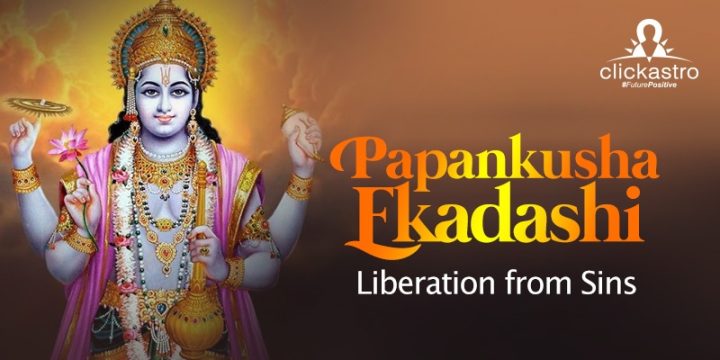Contents[hide]
Papankusha Ekadashi in 2024
This year, Papankusha Ekadashi will be observed on October 13, Sunday.
Significant Timings on Papankusha Ekadashi
| Sunrise | October 13, 2024 6:27 AM |
| Sunset | October 13, 2024 5:59 PM |
| Ekadashi Tithi Begins | October 13, 2024 9:09 AM |
| Ekadashi Tithi Ends | October 14, 2024 6:41 AM |
| Dwadashi Ends | October 15, 2024 3:42 AM |
| Hari Vasara Ends | October 14, 2024 11:57 AM |
| Parana Time | October 14, 1:21 PM – October 14, 3:40 PM |
Papankusha Ekadashi VratVidhi
Fasting for Papankusha Ekadashi starts from the day of Dashami. Devotees must wake up early before sunrise and must consume a single satvik meal during the day. This is to avoid the presence of grains in the body on Ekadashi day. One must avoid consuming the seven grains – wheat, rice, barley, urad, moong, gram, and lentils on Dashami day as these seven grains are worshipped on the day of Papankusha Ekadashi. On Ekadashi day, they must wake up during the Brahmamuhurta and, after completing their morning rituals and bath, must prepare the puja altar where a Kalash (urn) is placed on the altar. The devotees invoke the gods, pilgrimages, and the ocean into the urn. The offerings of incense sticks and Pancha Dravya (flowers, rice, soli, sandalwood, and water) are made into the urn. An idol of Lord Vishnu or Padmanabha is then placed on the altar and worshipped during the day. The devotees then take a Sankalp of observing silence and complete devotion to Lord Vishnu. This urn and idol are donated to the Brahmans after the fast. On Papankusha Ekadashi day, devotees must observe a strict fast and must abstain from speaking. This will clear one’s mind of evil thoughts and lies and have control over their emotions. The entire Ekadashi day is spent in complete devotion by reciting the hymns in praise of Lord Vishnu and chanting the Vishnu Sahasranama and other mantras, as well as reciting or listening to the Papankusha Ekadashi Vrat Katha. A Jagran is then observed where the devotees spend the entire night chanting and reciting Vedic mantras and bhajans praising Lord Vishnu. The fast is concluded on Dwadashi day by having a bath before sunrise. Lord Vishnu is worshipped as per the Archana Vidhi. Lord Vishnu in Padmanabha form seated on the Garud is prayed with utmost devotion. Devotees worship by offering betel leaves, flowers, and lighting diyas and incense sticks. An aarti is performed at the end of the Pooja. The devotees offer donations to the Brahmans, feed the cows, and donate food and money to the poor and the needy. It is believed that those observing the Papankusha Ekadashi fast and offering charity are atoned for their sins and obtain a place in Vaikunta – the abode of Lord Vishnu and saved from hell – the abode of Lord Yamaraja after death.Papankusha Ekadashi Vrat Katha
In ancient times, in the Vindhya mountains, there resided a cruel, insidious, and deceitful bird hunter named Krodhan. He spent all his life in violence, looting, drinking, and lies. When Krodhan reached his end, Yamaraja sent his messengers to kill Krodhan. When the messengers informed Krodhan that he would die the next day, Krodhan got scared. To save his life, he sought the help of Maharishi Angira. Listening to Krodhan’s pleas for help, the sage took pity on him and asked him to observe the Papankusha Ekadashi fast, which could free him from his sins. He advised Krodhanon on the ways to observe the rituals and fast, which the hunter dutifully followed. As a result of observing the Papankusha Ekadashi fast, Krodhan atoned for his sins and gained the blessings of Lord Vishnu, thus attaining salvation.Significance of Papankusha EkadashiVrat
The true essence of upavasa or fasting is not just limited to abstaining from food for a specific time. The profoundness of fasting lies in the word upavasa itself, wherein “upa” means close to, and “vasa” means to stay. Thus upavasa means remaining or staying close to the Supreme God, Lord Vishnu. The Vedic scriptures also mention many other upvasas, which correspond to a particular God seeking their blessing; however, the benefits derived from such upvasas are temporary, giving temporary happiness in the beginning. Hence it is believed that observing the fast dedicated to Lord Krisha provides devotees eternal blessings and benefits. Papankusha Ekadashi is observed after Indira Ekadashi and is followed by Rama Ekadashi. The significance of observing the Papankusha Ekadashi vrat has been explained by Lord Krishna to King Yudhishthira. Lord Krishna explained that observing the Papankusha Ekadashi and worshipping Lord Vishnu in the form of Padmanabha mounted on Sheshnag destroys the past and present sins of the devotees and saves them from the sufferings of Yamaloka.
By observing the fast, devotees attain wealth and prestige, enjoy all the luxuries in the universe, and attain salvation at the feet of Lord Vishnu. This Ekadashi provides salvation not just to the observer but also to the ten generations of their maternal and paternal sides of the devotees. Worshipping Lord Vishnu with full devotion, engaging in charity to the Brahmans and needs, and observing silence will help the individuals to earn blessings of a healthy and happy life.
Papankusha Ekadashi is observed after Indira Ekadashi and is followed by Rama Ekadashi. The significance of observing the Papankusha Ekadashi vrat has been explained by Lord Krishna to King Yudhishthira. Lord Krishna explained that observing the Papankusha Ekadashi and worshipping Lord Vishnu in the form of Padmanabha mounted on Sheshnag destroys the past and present sins of the devotees and saves them from the sufferings of Yamaloka.
By observing the fast, devotees attain wealth and prestige, enjoy all the luxuries in the universe, and attain salvation at the feet of Lord Vishnu. This Ekadashi provides salvation not just to the observer but also to the ten generations of their maternal and paternal sides of the devotees. Worshipping Lord Vishnu with full devotion, engaging in charity to the Brahmans and needs, and observing silence will help the individuals to earn blessings of a healthy and happy life.
The Papankusha Ekadashi festival dates – 2024 to 2027
| 2024 | Sunday, 13th October 2024 |
| 2025 | Friday, 3rd October 2025 |
| 2026 | Thursday 22 Oct, 2026 |
| 2027 | Monday, 11 Oct, 2027 |







